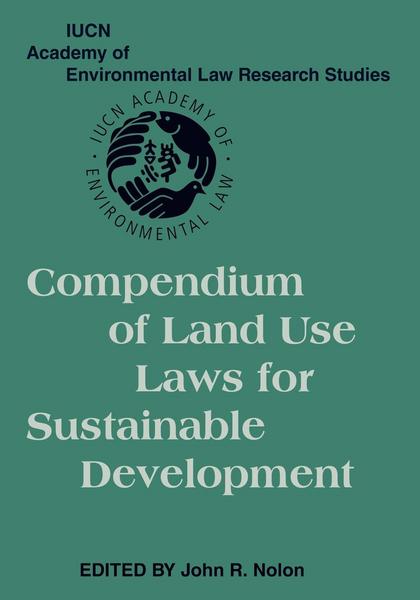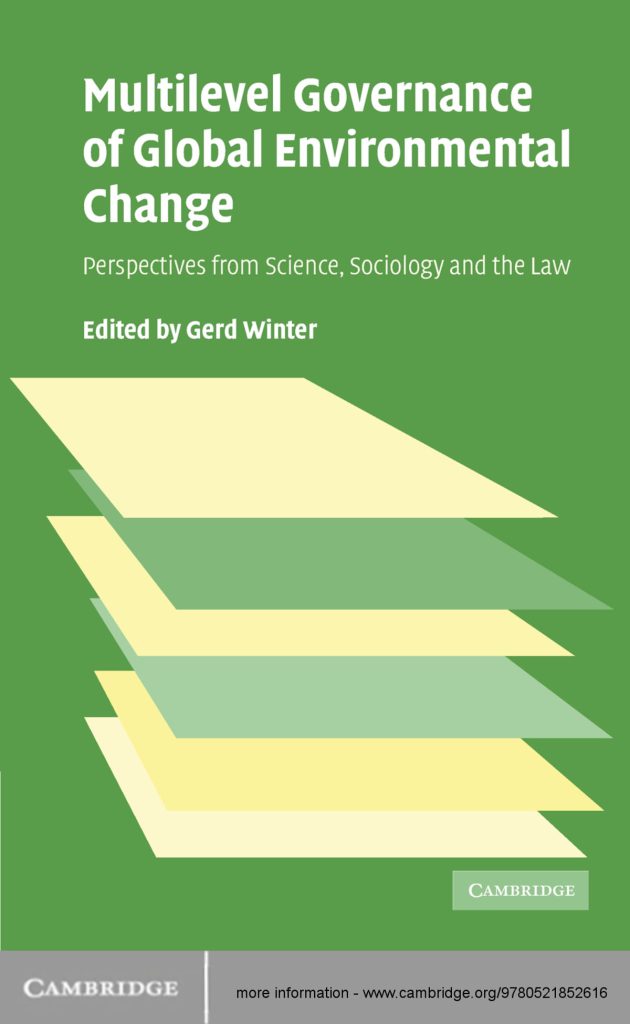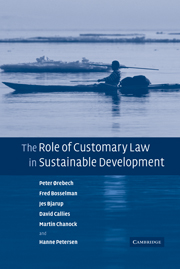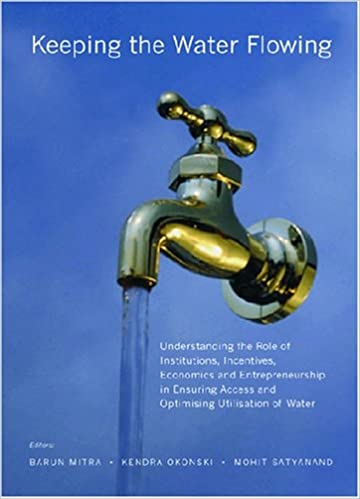
Volume 3/3
Ben Kiromba Twinomugisha
Some Reflections on Judicial Protection of the Right to a Clean and Healthy Environment in Uganda
In Uganda there has been significant progress in the field of environmental protection through various legal and policy strategies. The Constitution of Uganda and the National Environment Act contain novel provisions, including the right to a clean and healthy environment. The judiciary in Uganda has decided a number of cases concerning violations of this right. Against this background, this article reflects on the extent to which the judiciary has protected the right. The article finds that through a creative application of the right, the judiciary has to some extent held the state, its agencies and private actors accountable. The article concludes that there are still challenges facing judicial protection of the right. For an enhanced judicial protection of the right, the article recommends a more expanded application of relevant constitutional provisions. Environmental and human rights activists should not only educate the public on the right to a clean and healthy environment and its enforcement but also adduce necessary scientific and technical evidence in court.
Dejo Olowu
Environmental Governance Challenges in Kiribati : An Agenda for Legal and Policy Responses
Since the global notion of environmental governance is principally about how to achieve the goals of environmental conservation and sustainable development, analysing approaches to environmental governance invariably requires critical study of the policies and structures in place that determine how power is exercised and how environmental decisions are made not only in the abstract context of internationalism but with particular regard to national situations. This essay examines the legal and policy frameworks regulating environmental protection and the conservation of biodiversity within the broader goal of effective environmental governance in Kiribati . Acknowledging that Kiribati encounters formidable challenges in institutional, normative and policy terms, this essay particularly deals with the issue of pollution and its long- and short-term implications for this nation of many atolls. While highlighting the existence of significant treaties, municipal laws and diverse policy mechanisms, this essay identifies gaps and weaknesses, making suggestions for their reform and enhancement. Recognising that the path to the future lies in the synergy of initiatives and inputs from the government, the people and all other stakeholders in the environmental well-being of Kiribati, this essay proffers some viable trajectories for strategic responses.
Samuel Assembe Mvondo & Danielle Lema Ngono
Rights of Local Populations and Conservation of Forest Resources: Analysis of the Gorilla Sanctuary Case in Mengame-Cameroon
This article analyses the conflict between the rights of local populations and the need to safeguard natural resources in a protected area. Indeed, a careful examination of the hostility between the rights of local communities and the conservation of natural resources in the context of the Gorilla Sanctuary of Mengame in Cameroon, has shown that restrictions appear relatively severe in relation to a certain number of rights having been recognised to local populations. The tendency to ignore local populations’ collective rights goes against national legal spirit, international conventions and the interest of protected areas. In fact, the reconstruction of a new management model in this sanctuary is required, focused on the effective involvement of local actors in field activities.
Book reviews
Compendium of Land Use Laws for Sustainable Development
by John R. Nolon ed (Cambridge : Cambridge University Press, 2006)
Reviewed by Roopa Madhav, LEAD Journal

Multilevel Governance of Global Environmental Change : Perspectives from Science, Sociology, and the Law
by Gerd Winter ed (Cambridge: Cambridge University Press, 2006)
Reviewed by David Takacs, IELRC

Selected documents
Tanzania - Environmental Management Act, 2004

Philippines - Biofuels Act, 2006


Volume 3/2
SPECIAL WATER LAW REFORM
This issue draws on the results of the workshops organised by the International Environmental Law Research Centre (IELRC) on water law in Delhi in December 2006 and in Geneva in April 2007 in the context of the Indo-Swiss Research partnership on Legal Issues Related to Water Sector Restructuring, www.ielrc.org/water.
Preeti Sampat
"Swa"-jal-dhara or "Pay"-jal-dhara-Sector Reform and the Right to Drinking Water in Rajasthan and Maharashtra
Since the ascent of economic liberalisation in the 1990s, Washington Consensus policies – exemplified by structural adjustment and reform – have become the norm across the globe. As a result the State redefines its role from that of a provider of basic services to a “facilitator” that enables access to these services. Resources like water, energy, health and education are now called socio-economic goods that people must own and maintain on their own. Increasingly in all service sectors – energy, health, education or water-“demand-driven” projects formulated and executed by ‘user committees’ that are supposed to establish “community ownership” through initial cost-sharing with all operations and maintenance costs borne by the users. Added to this, establishment of independent regulatory commissions, like those witnessed in the power sector, mean that citizens can no longer hold the State accountable for securing basic services for citizens.
Reforms in the rural drinking water sector in India were adopted in 1999 through the Sector Reform Project (SRP) on a pilot basis and have been scaled up throughout the country in the form of Swajaldhara launched on 25th December 2002. It is premised on a demand-responsive approach where the community initially mobilises 10 per cent of the cost of the project demanded by it and the rest of the funds are contributed by Government of India (GoI). So far five phases of Swajaldhara have commenced on the official understanding that these would achieve a high degree of participation and community control that would meet the needs of water for all. Very often, the socio-political dynamic of a context alters significantly how policies and schemes are implemented and what they achieve for their intended beneficiaries.
A survey of 28 villages in Rajsamand and and Bhilwara districts of Rajasthan and 7 villages in Osmanabad and Latur districts of Maharashtra raises questions that need to be investigated if the right to water for all is to be realised. This paper will draw upon the findings of this survey to explore the dynamic between the Scheme and its ability to realise the right to water in an equitable and just manner. The parameters of Swajaldhara, the socio-political context and the process of implementation including bureaucratic practice will be examined to critique the rural drinking water policy of the Indian State and its underlying premise of Structural Adjustment.
Sushanta Kumar Mahapatra
Functioning of Water Users Associations or Pani Panchayat in Orissa: Principle, Procedure, Performance and Prospects
The current paper deals with an evaluation of water management through community participation and emergence of Pani Panchayat (PP) in a case study of the Vir Bajrang Bali Pani Panchayat under Lift Irrigation Project of the Hirakud Command Area (HCA), Orissa state in Eastern India . The broad objective of this paper is to examine the functioning of Water User Association (WUA) or Pani Panchayat promoted by the State and the local traditional irrigation institutions in the HCA, Orissa and to evaluate their functioning & characteristics in the context of local water management. The precise objectives are: 1) to analytically review the Orissa Farmers Management of Irrigation Systems Act and study the functioning of the Pani Panchayat, 2) to examine people’s participation 3) study the apparatus of water management and control, and the impact of such management on productivity among the members and 4) to recommend policy interventions to make the formal institutions more successful. The paper concludes that the Pani Panchayats performance as regulatory institutions in charge of water distribution on equitable basis has been weak and unsuccessful. Even though the Pani Panchayat has been initiated and endorsed in the State for more than a couple of years, the acceptance of this model have been lethargic and scattered. As Pani Panchayat is a new concept needing experimentation and experience before finalisation of its content in greater detail, the irrigation agency is not in a position to spell out the different components of the programme in concrete terms. A detailed action plan should be prepared by the irrigation authority in consultation with the water users through Participatory Rural Appraisal method. A feasibility study should be under taken by examining the caste/class conflict, groupism, political differences and history of confrontation and conflict, if any. It is necessary to apply a bottom-up approach instead of a top-down one for sustainability. There must also be mechanisms to ensure that the benefits of the project are equally distributed to all concerned stakeholders.
Mohamad Mova Al Afghani
Safeguarding Water Contracts in Indonesia
The provision of water and sewerage services has been in the public sector for thousands of years. However, the trend towards privatising these basic services has recently been growing. When dealing with Multinational Corporations (MNCs), governments face risks in the form of legal asymmetries.
This paper explains the theory and practice of water privatisation in Indonesia. It analyses the legal anatomy of privatisation, from the regulatory to the contractual levels. It attempts to highlight important issues and risks that governments and other stakeholders need to focus on when dealing with privatisation.
A. Anderson, G. Quibell, J. Cullis and N. Ncapayi
General Authorisations as a Tool to Promote Water Allocation Reform in South Africa
South Africa faces significant inequities in access to and use of water for productive purposes. The National Water Act seeks to address these inequities and introduced a public rights system where water is owned by the people of South Africa and held in custody by the state. This public trust doctrine forms the basis for the State to give effect to its constitutional obligation for redress. Compulsory licensing is a mechanism to proactively reallocate water on a catchment basis to achieve redress, while at the same time promoting economic efficiency and ecological sustainability. During compulsory licensing, all users are required to reapply for their water use entitlement, and a process is followed to allow for a fairer allocation of water between competing users and sectors. Some concerns have been raised that equity may not be achieved through compulsory licensing as historically disadvantaged individuals may not have the capacity to partake in the process. Similarly, the administrative burden of processing large numbers of licences from small scale users may cripple licensing authorities. Moreover, the compulsory licensing process, while encouraging Historically Disadvantaged Individuals (HDIs) to apply, may have little impact on poverty if the poorest are not able to participate in the process. General authorisations are proposed as a way of addressing these concerns by setting water aside for specific categories of users. This paper introduces the concept of general authorisations in support of compulsory licensing and outlines some of the implementation challenges.
G.J. Pienaar & E. van der Schyff
The Reform of Water Rights in South Africa
South Africa’s water law dispensation changed dramatically with the promulgation of the National Water Act 36 of 1998. The previous distinction between public and private water was abolished and the public trust doctrine was statutorily incorporated. Due to the working of the public trust doctrine existing water use rights which were in force before 1998, were replaced by water allowances granted in the discretion of the relevant authority.
Three key issues are investigated in this work. First the history and development of water rights in South Africa are discussed. Secondly the system of water allowances is analysed to determine the socio-economic effects of these measures.
Thirdly the question whether the state expropriated vested rights in property through the transition brought about by the incorporation of the public trust doctrine is discussed. The new concept of property and the distinction between deprivation and expropriation as dealt with in section 25 of the Constitution are examined. It is indicated that the concept of property in South African law has been extended to include pre-existing water use rights and it is argued that it also enfolds water allocations made in terms of the Act. Due to the application of the public trust doctrine it is doubtful whether any legitimate deprivation of a water use allocation can be defined as an expropriation. This issue is considered with reference to the requirements set for deprivation and expropriation in South African law.
Pieter Jong
The Water System and Water Chain in Dutch Water and Environmental Legislation
This paper deals with Dutch legislation on the water system and water chain. In brief, the water system is the totality of surface water and ground water, which belong together to the natural environment; while the water chain lies in the sphere of public utilities, comprising the pathway from drinking-water supply to wastewater treatment. The water system is regulated in legislation for which the M inistry of Transport, Public Works and Water Management is responsible. The water chain is regulated in legislation for which the Ministry of Housing, Spatial Planning and the Environment is responsible. The present paper considers, with reference to some recent Parliamentary bills, how the water system and the water chain will be regulated in the coming years. The Water Act is particularly important; this Act implies a huge modernisation of traditional Dutch water law. Particular attention is paid in this connection to the role of municipalities in relation to the water system and water chain. In the terms used in the above-mentioned bills, a municipality cannot be regarded as a water manager, though it has certain tasks that are of importance for water management.
Naren Prasad
Privatisation of Water: A Historical Perspective
Currently, over one billion people worldwide do not have access to drinking water, especially in the developing countries. Since access to water supply became one of the Millennium Development Goals (MDG), greater attention has been given to this sector. Increasing water coverage and maintaining infrastructure is one of the biggest challenges confronting the water supply sector in developed and developing countries. Very often, water sector reform takes place by involving the private sector. How did this debate start and what is the rationale for the involvement of the private sector? This article looks at the history to demonstrate that private sector has indeed been instrumental in developing water infrastructure in industrialised countries. It also shows how international organisations have shaped today’s water debate. It concludes by arguing that private sector participation in water supply may not be the right option and calls for re-thinking of the water debate.
Francesca Bernardini
A Modern Approach to Water Management: The UNECE Protocol on Water and Health
The Protocol on Water and Health to the Convention on the Protection and Use of Transboundary Watercourses and International Lakes entered into force in August 2005. It is jointly serviced by the Regional Office for Europe of the World Health Organisation and the United Nations Economic Commission for Europe.
The main aim of the Protocol is to protect human health and well-being by better water management, including the protection of water ecosystems, and by preventing, controlling and reducing water-related diseases.
The Protocol recognises that engaging in intersectoral partnerships and increased coordination greatly enhances sustainable development. It is closely linked to the Millenium Development Goals (MDGs), more particularly, the Protocol offers a platform to go beyond MDG target 10, since its final objective is to grant access to drinking water and sanitation to everybody. The Protocol takes into account differences in health, environmental and economic conditions in the region, and gives State Parties the freedom to establish their priorities tailored to their specific situations.
Moreover the Protocol displays innovative features of modern environmental law:
It provides for the establishment of a mechanism for review of compliance of a non-confrontational, non-judicial and consultative nature which will significantly increase its effectiveness;
It includes provisions for international cooperation and international support for national action to support its implementation.
This article reviews the decisions taken by the Protocol’s Parties at their first meeting in January 2007 which set the future direction of work and establish the institutional architecture of the Protocol.
Comments
The Use of the Public Trust Doctrine in Environmental Law
by Patricia Kameri-Mbote

Volume 3/1
C.R. Bijoy
Access and Benefit Sharing from the Indigenous Peoples’ Perspective: The TBGRI-Kani ‘Model’
The ethno-botanical knowledge of the Kani people related to a plant identified as ‘arogyapacha’ was utilised to develop, transfer, produce and internationally market ‘Jeevani’ as an anti-fatigue, adaptogenic and immuno-enhancing formula by the Tropical Botanical Garden Research Institute, India. Showcased and acclaimed internationally as a model benefit-sharing arrangement, various issues have been posed upon deeper analysis relevant to benefits accrued in the context of indigenous peoples with regards to genetic resources associated to traditional knowledge. This model is also placed in the specific context of the non-implementation of the laws on land rights in Kerala and absence of even such a law in Tamil Nadu, and the violations of rights of Kanis to forests as stipulated in the forest laws and the denial of the rights to self-governance under the Constitution to Scheduled Tribes by these two states. The new national legal regimes in compliance with Convention on Biodiversity and TRIPS, rather than recognising the rights of Adivasis or Indigenous Peoples, further infringes their rights accorded in the limited international laws related to territorial rights, rights to resources and self-governance/self-determination.
Daniel Mirisho Pallangyo
Environmental Law in Tanzania; How Far Have We Gone?
Over the past few decades, environmental protection has emerged from a point of obscurity to one of the important issues of our time. Both at the international and national planes, the dominant theme of the environmental protection movement is the achievement of sustainable development. This paper analyses environmental law and institutions in Tanzania. The study develops an understanding of various environmental laws and institutions (both the old and current laws and policies) for the purposes of looking at the extent in which Tanzania has advanced in the protection of environment. The major discussion evolves around the Tanzanian environmental policy, laws and institutions and how the same covers the major environmental issues today. The author concludes that although the Constitution of the United Republic of Tanzania provides for the ‘right to health environment’, the major environmental issues are not adequately addressed by Tanzanian environmental laws. The Environmental Management Act, 20 of 2004 serves as a framework Act and can only be effective after the promulgation of the regulations to implement it by the Minister. This has not been done yet.
Thaqal S. Al-Ajmi
Maritime Transport of Environmentally Damaging Materials - A Balance Between Absolute Freedom and Strict Prohibition
This study is intended to balance the rights of free navigation in all of its forms whether in the high seas or in the territorial waters of other States by resorting to the right of innocent passage and right of transit passage, which is enjoyable by all States and the obligation to protect the environment from any damaging materials as imposed upon all States at the same time, when such damaging materials are shipped from one State to another via seas or oceans. According to this study, which presented many evidence from international law and regional and even national practice, the obligation to protect the environment supersedes the right of free navigation, therefore restricting the right to ship or transport materials that could cause damage to the environment.
Qin Tianbao
China’s Peaceful Development and Global Climate Change: A Legal Perspective
Since the adoption of the reform and opening-up policy, China has witnessed rapid socio-economic progress accompanied by serious environmental problems, such as climate change, which have had a major impact on the global environment and aroused international concern about China’s peaceful development. International law on climate change has taken shape with the core instruments of the 1992 Framework Convention on Climate Change and the 1997 Kyoto Protocol. Under the current arrangement China is temporarily exempt from having to reduce its emissions of greenhouse gases (GHGs), although it will face strong pressure to commit to do so in the near future. In order to prepare for future challenges and to ensure peaceful development, it is proposed that China takes the initiative at the international level, participates in events and negotiations on implementation in respect of climate change, stresses the integration of state interests and the common interest of humankind, argues for the responsibility allocation principle of common but differentiated responsibilities of developed and developing countries, and undertakes international cooperation with regards to the Clean Development Mechanism (CDM). At the national level, it is advisable that China persists in and develops a legal system that favours recycling and improves policies and laws on energy and resources with a view to consolidate the construction of a conservation-minded society.
Hans Morten Haugen
The Right to Self-Determination and Natural Resources: The Case of Western Sahara
Phosphate, fish and possibly oil and gas all constitute important natural resources found on the territory and in the waters of Western Sahara. The importance of these natural resources must be recognised in order to understand the stalemate in the attempted process of decolonisation from Morocco which has been going on for more than 30 years. The article analyses the “resource dimension” of the right to self-determination, as recognised in human rights treaties and in Resolution III of the UN Conference on the Law of the Seas, as well as several resolutions from the United Nations General Assembly. If the resources are exploited in a manner which does not benefit the peoples seeking to enjoy the right to self-determination, such exploitation is illegal. The article shows that the current exploitation takes place in a manner contrary to the interests of the local population, the Saharawis. The article also demonstrates that recent license agreements with Saharawi authorities in the field of oil and gas, signal a potentially new and constructive approach by international corporations.
Comments
Environmental Regulation in Uganda: Successes and Challenges
by Christine Echookit Akellol
The development of environmental regulatory framework in Uganda was initiated by the national environment action planning process in 1990, as a realization that environment needed special focus. As a result of the said process environmental policy and law were developed. The 1995 constitutional of the Republic of Uganda was among the first ever such constitution in the East African region to deliberately enshrine the right to a decent environment and to provide for sustainable development, in addition to the principle that natural resources are held in trust for the people and should be responsibly managed for their benefit. Following the constitution, a number of environment legislations were enacted and others were revised to take into account environmental cardinal principles and considerations, including embedding in them environmental regulatory provisions. Hence, in addition to the framework of National Environment Act, a number of environment sect oral legislation exists and environmental management is spread throughout the respective institutions responsible for aspects of the environment. It is therefore safe to say that Uganda has developed a lot of legislation on the environment but the challenge remains that of developing more regulations under the relevant parent Acts, effective monitoring and enforcement.
Book reviews
The Role of Customary Law in Sustainable Development
by Peter Orebech, Fred Bossleman, Jes Bjarup, David Callies, Martin Chanock and Hanne Petersen (Cambridge: Cambridge University Press, 2005)
Reviewed by Roopa Madhav, LEAD Journal

Keeping the Water Flowing: Understanding the role of Institutions, Incentives, Economics and Entrepreneurship in Ensuring Access and Optimising Utilisation of Water
by Barun Mitra, Kendra Okonski and Mohit Satyanand eds (New Delhi: Academic Foundation, 2007)
Reviewed by Usha Ramanathan, LEAD Journal

Selected documents
Ethiopia – Proclamation to Provide for Access to Genetic Resources and Community Knowledge and Community Right, 2006
